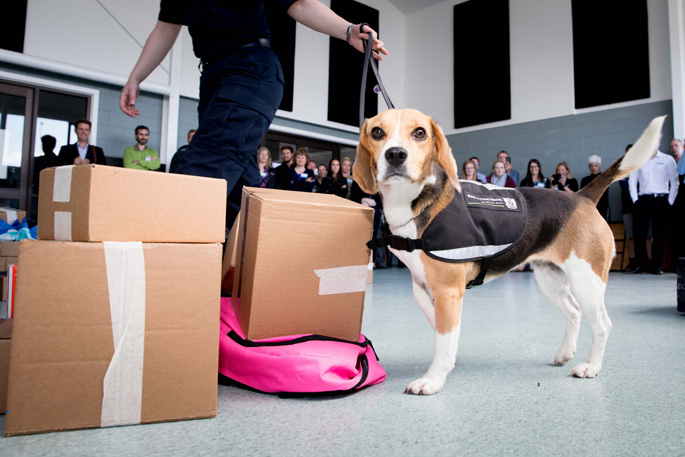Tauranga Harbour, already invaded by more than 45 exotic marine organisms, is under threat from future incursions, says Carlton Bidios, co-chair of Tauranga Moana Biosecurity Capital.
“I believe the estimate of 45 is at the lower end of what is really in the harbour,” he told people at the launch of TMBC last month.
Global warming and sea level rise also present risks of more invasions and protecting the marine and on-shore environments is the aim of TMBC – one of the lead initiatives of the Government’s ‘Ko Tatou This Is Us’ campaign.
In mid-October the region officially became Tauranga Moana Biosecurity Capital when it was launched by Minister for Biosecurity and Primary Industries Damien O’Connor.
TMBC aims to be an exemplar for other regions to emulate, all with the aim of enlisting New Zealand’s 4.7 million citizens into a biosecurity team to keep the country safe from unwanted pests and disease.
It was appropriate that Tauranga, as New Zealand’s export trade capital, should become its biosecurity capital too, the Minister told around 80 representatives of iwi, local and regional councils, industry bodies, community and business groups with an involvement or interest in biosecurity at TMBC’s launch.
‘Worse than Rena’
Among speakers was marine ecologist and environmental scientist Professor Chris Battershill, who is director of the University of Waikato’s marine field station in Tauranga.
He spoke of the many exotic species already established in NZ waters, and the near-miss the Bay of Plenty had from further invasions when a barge arrived to help in recovering the wreck of the Rena cargo ship on Astrolabe Reef in November 2011.
The hull of the crane barge, Sea-Tow 60, sent from Gladstone Harbour in Queensland to assist with the unloading of Rena containers, was not cleaned before it left Australia.
Fortunately, the unintended oversight was identified when it got to Auckland and the barge was cleaned before sailing for Tauranga. “If it hadn’t been cleaned, the potential impact on water around Motiti Island could have been worse than the damage caused by the Rena itself,” says Chris.
He believes marine invaders have the potential to seriously damage an environment they colonise because they alter it to suit themselves, while making conditions worse for native species.
As an example, he quoted what happened in Europe’s Black Sea when invaded in 1987 by the voracious comb jellyfish from North America (Mnemiopsis leidyi).
“The jellyfish was introduced through ships’ ballast water and led to the collapse of the Black Sea fisheries within 10 years.”
Medical use
Ship-borne invasions are also a threat to NZ but the current practice of ships de-ballasting in mid-ocean, new anti-fouling paints that are less toxic to the marine ecosystem and a recognition by shipping companies that clean hulls increase the efficiency and speed of vessels, help reduce the risk.
However, exotic species have become well established in NZ waters and attention is turning to ways of finding a commercial use for them, off-setting or reducing costs of eradication or control. While some seaweeds are edible, many have interesting chemistry which could be of benefit. This includes potential treatments for carcinoma and ovarian cancer, and a possible treatment for kiwifruit vine disease Psa-V.
However, exciting those prospects might be Chris says preventing new arrivals is crucial and this involves constant surveillance. While shipping lines and marina companies are vigilant in checking hulls of vessels, there are many recreational boats left on moorings with fouled hulls that he urges owners to check.
TMBC programme director Andrew Harrison says the coalition’s aims is to increase local awareness about biosecurity and “why it matters deeply to all of us who live here and just what would be lost if exotic pests enter or establish here”.
“It’s about a pretty powerful, knowledgeable group standing shoulder-to-shoulder and saying: ‘It’s absolutely essential we pool our expertise and resources for the sake of the environment, our taonga, our economy’.”
Everyone affected
Ministry for Primary Industries deputy director of general strategy performance and engagement, John Walsh, told attendees that major biosecurity breaches have the potential to irreversibly change New Zealanders’ way of life, but only around two per cent of the population recognise that threat.
“Around 96 per cent of New Zealanders get that biosecurity is important but when those surveyed were pressed for more specific details it revealed most did not think that if biosecurity went wrong it would have a big impact on their lives,” says John.
In fact, invasions of unwanted pests and diseases have the potential to affect every aspect of Kiwi life from gardening, to food, primary production, recreation, industry, employment, to the natural environment, which is why the campaign ‘Ko Tatou This Is Us’ has been launched.
The campaign, which includes a television commercial designed to build an emotional connection among the public with the things they value, is augmented by social media blogs, newspaper and radio advertisements and a website. All designed to raise awareness of biosecurity.
“We invite everyone to use the brand ‘Ko Tatou This Is Us’ and come on board with the campaign,” says John.
Grow awareness
TMBC’s aims are to grow biosecurity awareness and social licence, including running joint campaigns.
It aims to advocate for better biosecurity for the region and be a catalyst for action. Enabling collaboration to achieve better results, sharing information and lessons, and taking opportunities to grow the regional team committed to biosecurity excellence, are also aims.
Founding members include range of government organisations, businesses, industry bodies and councils. Find out more at: www.tmbiosecurity.co.nz and www.thisisus.nz



0 Comments
Leave a Comment